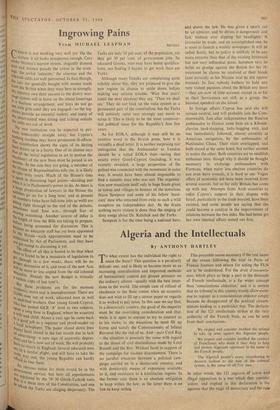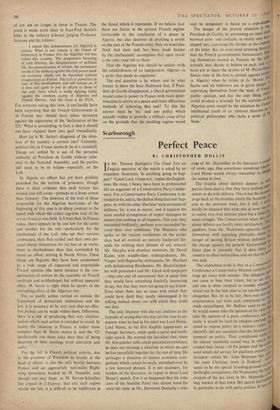Algeria and the Intellectuals
By ANTHONY HARTLEY rro what extent has the individual the right to I resist the State? This question is a peculiarly delicate one, and is likely to become more so as increasing centralisation and improved methods of bureaucratic control put greater pressure on the ordinary citizen—usually with the best inten- tions in the world. The simple case of refusal of obedience to the State comes when an eccentric does not wish to fill up a census paper or regards it as wicked to pay taxes. In this case we say that, in a democratic country, the good of the majority must be the overriding consideration and that, while it is open to anyone to try to convert us to his views, in the meantime he must fill up forms and satisfy the Commissioners of Inland Revenue like the rest of us. And—pace Cyril Ray —the situation is precisely the same with regard to the threat of civil disobedience made by Lord Russell and the Rev. Michael Scott in support of the campaign for nuclear disarmament. There is no parallel whatever between a political cam- paign carried on in a democratic country, and with democratic means of expression available to it, and resistance to a totalitarian regime. In the former case there is an absolute obligation to keep within the law; in the latter there is no law to keep within. This preamble seems necessary if the real issues of the events following the trial in Paris of Francis Jeanson and others for aiding the FLN are to be understood. For the droit d'insoumis- slot', which plays so large a part in the demands of French intellectuals, is a far wider concept than 'conscientious objection,' and it is certain that no tribunal in this country would allow some- one to register as a conscientious objector simply because he disapproved of the political circum- stances leading to a particular war. The declara- tion of the 121 intellectuals strikes at the very authority of the French State, as can be seen from their conclusions: We respect and consider justified the refusal to take up arms against the Algerian people.
We respect and consider justified the conduct of Frenchmen who deem it their duty to help and protect Algerians oppressed in the name of the French people.
The Algeriah people's cause, contributing in decisive fashion to the ruin of the colonial system, is the cause of all free men.
In other wordS, the 121 approve of active and illegal opposition to a war which they consider unjust. and implied in this declaration is the opinion that the reign of democracy and the rule of law are no longer in force in France. The point is made quite clear in Jean-Paul Sartre's letter to the military tribunal judging Professor Jeanson and his fellows: . . I repeat this independence [of Algeria] is certain. What is not certain is the future of democracy in France. For the Algerian war has rotted this country. The progressive lessening of civil liberties, the disappearance of political life, the generalisation of torture, the permanent revolt of the military against the civil power mark an evolution which can be described without exaggeration as Fascist. The Left is powerless in face of this development and will remain so, if it does not agree to join its efforts to those of the only force which is really fighting today against the common enemy of Algerian and French liberties. And this force is the FLN.
For someone taking this view, it can hardly have been surprising that the French Goi+ernment in its Fascist way should have taken measures against the signatories of the 'declaration of the 121.' What is astonishing, in fact, is that it should not have clapped them into gaol immediately. How far is M. Sartre's diagnosis of the situa- tion of his country a correct pne? Certainly, political life in France seems to be at a standstill. Things are settled by a use of the personal authority of President de Gaulle without refer- ence to the National Assembly, and the parties still seem to be in eclipse—especially on the Left.
In Algeria no officer has yet been publicly punished for the torture of prisoners, though there is clear evidence that such torture has existed and still exists—perhaps to a lesser extent than formerly. The slowness of the trial of those responsible for the Algerian barricades of the beginning of this year is in sharp contrast to the speed with which the rather rag-time trial of the reseau Jeanson was held. It is true that, in France today, there appears to 'be one law for the army and another for the rest—particularly for the intellectuals of the Left, who see their reviews confiscated, their flats raided and their own per- sonal liberty threatened for far less of an incite- ment to disobedience than that committed by many an officer serving in North Africa. These things are flagrant; they have been condemned by a wide range of organised and responsible French opinion (the latest instance is the con- demnation of torture by the assembly of French cardinals and archbishops), but without apparent effect. M. Sartre is right when he speaks of the corrupting effect of the Algerian war.
Yet, to justify action carried on outside the framework of democratic institutions and the law, it is necessary to be very sure that no effec- tive protest can be made within them. Otherwise, there is a risk of producing that very totalitar- ianism which such action is intended to avoid. In reality the situation in France is rather more complex than M. Sartre makes it, and the 121 intellectuals run more risks than that of being deprived of their earnings from television and radio.
For tlie lull in French political activity, due to the presence of President de Gaulle at the head of affairs, is also the only barrier between France and an aggressively nationalist Right- wing movement headed by M. Soustelle, and, though one may hope, as M. Servan-Schreiber has argued in L'Express, that any such regime would not last, it is difficult to be indifferent to the threat which it represents. If we believe that there are forces in the present French regime favourable to the conclusion of a peace in Algeria, but also desirous of avoiding a revolt on the part of the French army, then we must also think that their task has been made harder by the intellectuals' assumption that open revolt is the only road left to them.
That the Algerian war should be ended—with the establishment of an independent Algeria—is a point that needs no argument.
The real question is by whom and by what means. Is there the least likelihood that, if Presi- dent de Gaulle disappeared, a liberal government would come to power in France with more deter- mination to arrive at a peace and more efficacious methods of achieving that end? To this the answer must be 'no,' and any policy which actually wishes to provoke a military coup d'etat on the grounds that the resulting regime would only be temporary is based on a pipe-drool' The danger of the present situation is that President de Gaulle. by preventing an open clash between' army and civilians, in reality maY Vic slipped into appeasing the former at the exPense of the latter. But an even more pressing threat Is that the French governmental bureaucracy• find: ing themselves treated as Fascists by the line!. lectuals, may decide to behave as such. and It IS hard not to share the doubts of M. Pierre-Henri Simon (one of the first to protest against torture in Algeria) when he writes in Le Mond" that Sartre and his followers are in grave danger n, separating themselves from the mass of French public opinion, and that the only thing whit, could produce a triumph for the activists of the Algerian army would be the adoption by French intellectual youth of an 'abstract theorem Wei,: political philosopher who lacks a sense of the State.'



















































 Previous page
Previous page